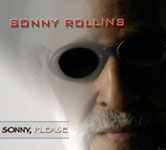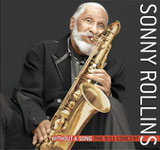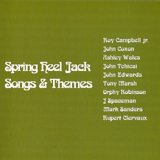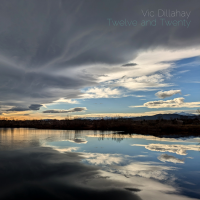Home » Jazz Articles » Profile » Sonny Rollins: Touring, Life Today and the Future
Sonny Rollins: Touring, Life Today and the Future
As long as I have energy, I'll keep going. I mean, what else can I do? Music is my life.
 Jazz great Sonny Rollins is gearing up for an ambitious 2008 touring season, which will take him from the West Coast (April 3 at UC Berkeley's Zellerbach Hall and April 5 at Cerritos Center for the Performing Arts in Southern California), then east for appearances at Washington, D.C.'s Kennedy Center, April 18, and Morristown, N.J., April 26.
Jazz great Sonny Rollins is gearing up for an ambitious 2008 touring season, which will take him from the West Coast (April 3 at UC Berkeley's Zellerbach Hall and April 5 at Cerritos Center for the Performing Arts in Southern California), then east for appearances at Washington, D.C.'s Kennedy Center, April 18, and Morristown, N.J., April 26.
In May he will play in Japan, Korea and Singapore. After resting in June, his sextet will travel to France and Italy in July, returning in August to play three U.S. festivals. Catching his breath in September, he has scheduled three October dates in Sao Paulo and Rio during Brazil's famous Tim Festival. The group's touring winds up late fall with several dates in Germany and Switzerland.
Pretty good for a jazz legend coming up to his 78th birthday. (Sonny hates the word "legend"; he says he doesn't know what it means about him.) During a recent telephone interview at his home in Germantown, along the Hudson River in New York, he talked about his lifestyle nowadays and what lies ahead for him.
Despite long flights coming up that would wear down even the youngest artist, he looks forward to his heavy international schedule. "As long as I have energy, I'll keep going," he says. "I mean, what else can I do? Music is my life." With a health-food regimen and a quiet country life, he figures he stays in pretty good shape. "I eat healthy and do a little yoga each day," he says. Practice on his tenor sax occupies a couple hours daily.
For the most part today, he stays home alone when not on the road, roaming around the house, listening to talk radio, watching a little TV. Asked about what music he listens to, with mock chagrin, Rollins replies, "Well, I don't listen to music very much, and I feel bad about it. I really should keep up with what's going on." He vows somewhat seriously, "I'm going to try to do better, though, and listen to jazz more " He did say that there were many very talented younger players out there who he admires, saxophonists Joshua Redman and Kenny Garrett, in particular.

His parents emigrated from the Virgin Islands, and Rollins says he and his wife used to travel down to Virgin Gorda yearly. His beloved spouse, Lucille, died in 2004 however, leaving a big cavity in his life. Since her death he hasn't been back. "I just haven't felt like getting out much," he says. "Maybe after a little more time, but it gets difficult at my age traveling on your own." Travel to perform is his agenda now.
Rollins especially looks forward to his May gigs in the Orient. In the late sixties, he journeyed to Japan to perform and then went on to India to study yoga and Eastern religions. He loves playing in Japan, saying the fans really appreciate the music. He sees irony, though, in a comparison between Japan and America. "In Japan people are more aware of our music. There are TV programs devoted to jazz, unlike here nowadays," he says. "U.S. fans are great, but the problem is that they are not given enough exposure to jazz in media and there is a lack of [venues]. Jazz is our classical music; not enough people are given the chance to listen to it"
Starting out in New York City in the late forties, with no less than Thelonious Monk taking him under his wing, Rollins has certainly paid his dues. There were a lot of clubs in town in those days, providing plenty of chances to learn the music craft. It was a hard-scrabble life, though; the pay was low and the temptation for drugs was large.
Rollins discussed the scene today in which students are increasingly studying jazz in colleges, with 120 schools offering jazz programs. He is happy to see young people getting into music but points out that it is still difficult to make a good living. Many musicians have to fall back on teaching or music-related jobs while playing in ever-fewer local clubs at night. But mostly players today don't have to deal with the problems of making it on the streets. On this, he says, "That part of it is good, not to have to suffer as musicians did when I was starting out."

Over the last few years, Rollins' career has been going well. He won his first performance Grammy in 2002 for This Is What I Do (Fantasy, 2001), and his second in 2004 for Without A Song: The 9/11Concert (Milestone). The concert and CD commemorating the World Trade Center disaster was his first live record in eighteen years.
That recording was well received. The date, however, almost didn't happen. "I was in our New York apartment when the disaster took place. I could hear it all happening," he says. "Lucille was at home and I called her to fill her in" Four days later he was asked to play a memorial concert in Boston. "At first, I didn't want to do it. I was still too wobbly," he says. "Lucille finally persuaded me to go on."
Next up for Rollins is the release of his first official DVD, scheduled for April. "It's recorded with the group live in a concert we gave in this lovely old Roman amphitheater in Vienne, France," he says.
At this point in his career, Rollins is respected worldwide as one of the remaining true geniuses who were there at the birth of modern jazz. He made his recording debut in 1949 and has played over the decades with a hall-of-fame array of greats including Miles Davis, Bud Powell and Clifford Brown. He has composed numerous jazz classics; his improvisational skills are rated among jazz's most creative.

Conceivably, it could be time for Sonny to write down his story. Adamantly, he says: "Not right now. Some of my experiences I would have to deal with might be too painful to examine. Maybe in ten years I'll start my autobiography." In the meantime, he'll get ready to go on the road with his cohorts—trombonist Clifton Anderson, bassist Bob Cranshaw, guitara Bobby Broom, drummer Kobie Watkins and conguero Kimati Dinizulu.
Near the end of our conversation, I recalled my talking to two young college students before a recent Rollins concert. They had recently been "turned on" to Rollins' music and were enthused about a CD just purchased, The Bridge (Bluebird/RCA, 1962), named for the saxophonist's legendary practice site—the upper confines of New York's Williamsburg Bridge. He went there for privacy during his two years off the jazz scene, 1959-61. After coming back, he made the album with a quartet featuring guitarist Jim Hall. After hearing this story, Rollins reflected: "It makes me humble to feel that I have made music to reach younger people like that."
Selected Discography
Sonny Rollins, Sonny, Please (Doxy, 2006)
Sonny Rollins, Without a Song: The 9/11 Concert (Milestone, 2005)
Sonny Rollins, This is What I Do (Fantasy, 2001)
Sonny Rollins, Sonny Rollins Plus Three (Milestone, 1996)
Sonny Rollkins, No Problem (Fantasy, 1981)
Sonny Rollins, Don't Stop the Carnival (Milestone/OJC, 1978)
Sonny Rollins, The Bridge (Bluebird/RCA, 1962)
Sonny Rollins, Way Out West (Contemporary/OJC, 1957)
Sonny Rollins, Tenor Madness (Prestige/OJC, 1956)
Sonny Rollins, Saxophone Colossus (Prestige/OJC, 1956)
Photo Credits
Top Photo: Hans Speekenbrink
Bottom Photo: Jose Manuel Horna
Tags
PREVIOUS / NEXT
Support All About Jazz
 All About Jazz has been a pillar of jazz since 1995, championing it as an art form and, more importantly, supporting the musicians who make it. Our enduring commitment has made "AAJ" one of the most culturally important websites of its kind, read by hundreds of thousands of fans, musicians and industry figures every month.
All About Jazz has been a pillar of jazz since 1995, championing it as an art form and, more importantly, supporting the musicians who make it. Our enduring commitment has made "AAJ" one of the most culturally important websites of its kind, read by hundreds of thousands of fans, musicians and industry figures every month.



























